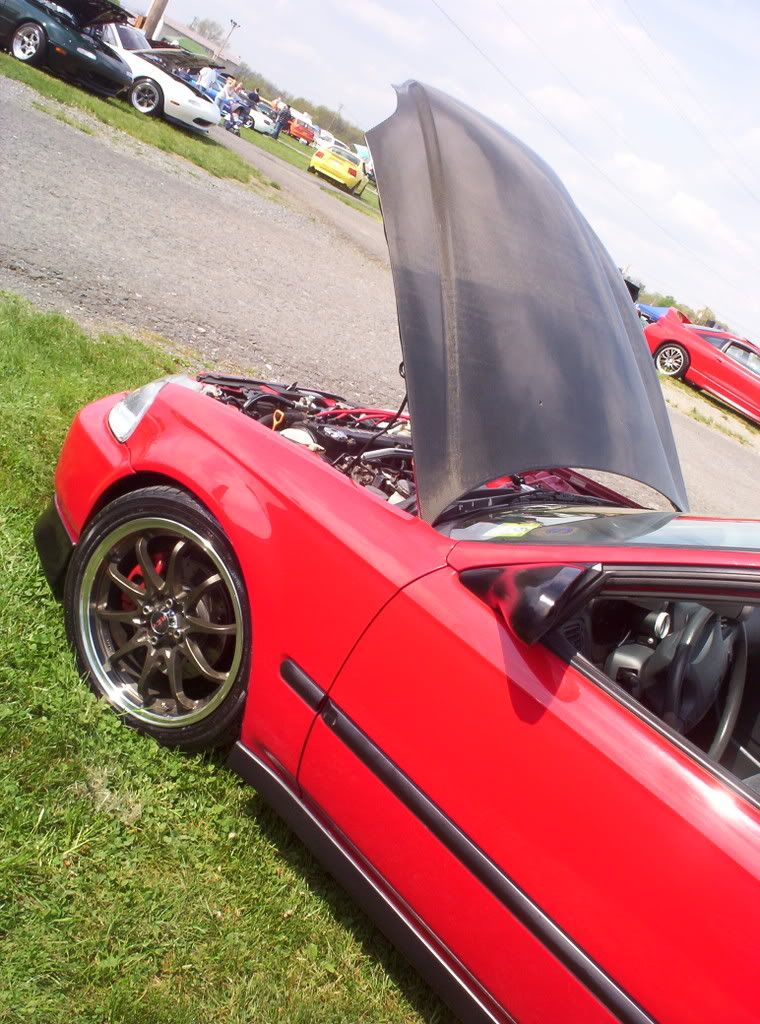Post by dohcterek on Mar 27, 2008 0:58:29 GMT -5
From www.evans-tuning.com
For the last century, horsepower has been used to describe the power output of the internal combustion engine. The horsepower unit was created by James Watt in the 18th century. Its origin is based from how much power a horse could lift in foot pounds, 33,000 ft-lbs to be exact in one minute. The unit is derived from torque, which is the true measurement of the engine physical power production.
What is strange about the units of horsepower is that it has no physical meaning. Its an arbitrary unit that has no real signficance in describing the characterisitc of the engine. For those that are curious to calculate horsepower:
Horsepower=(rpm/5252)*torque
From this equation you can see that horsepower is nothing more than a contrived unit that is based purely from torque and rpm. You'll notice the number 5252 in the equation, this represents the point at which every dyno graph must intersect horsepower and torque. Its a mathematical relationship, both strange and interesting since horsepower is a function of torque and rpm.
There has been much confusion and rumors across the internet about gaining more horsepower. In essence, gaining more horsepower is gaining torque. If you are after "peak" horsepower, you are interesting in carrying the torque curve as high in the rpm range without falling as possible. You can see from the equation that as the rpm's increase, and the torque remains the same you get a higher horsepower number.
What phsycially is happening is that the engine is able to produce enough torque to overcome frictional forces through the air, tires, etc. As you are able to keep the torque from falling off on the top end, you are able to maintain a steady torque curve that will "pull" the car through the mph you are trying to reach. So people who are after "peak" horsepower really want to extend their torque curves as far towards redline as possible, without letting the torque fall off. Check out some dyno graphs and see what I mean. Horsepower doesnt describe the true nature of how the engine performs, its the torque curve.
From a tuners perspective, I dont tune off of the horsepower curves. The physical relevance towards the engine performance is arbitrary, since the torque is truely what is effected by the fuel, timing, breathing, etc of the engine. The horsepwer is merely a concocted unit of measure, showing no true characteristics of the engine power output. A good tuner will only make changes from the torque curves, see what increase/decrease the curves show from the changes. So next time you are thinking horsepower, think "what would I want my torque curve to be"?
For the last century, horsepower has been used to describe the power output of the internal combustion engine. The horsepower unit was created by James Watt in the 18th century. Its origin is based from how much power a horse could lift in foot pounds, 33,000 ft-lbs to be exact in one minute. The unit is derived from torque, which is the true measurement of the engine physical power production.
What is strange about the units of horsepower is that it has no physical meaning. Its an arbitrary unit that has no real signficance in describing the characterisitc of the engine. For those that are curious to calculate horsepower:
Horsepower=(rpm/5252)*torque
From this equation you can see that horsepower is nothing more than a contrived unit that is based purely from torque and rpm. You'll notice the number 5252 in the equation, this represents the point at which every dyno graph must intersect horsepower and torque. Its a mathematical relationship, both strange and interesting since horsepower is a function of torque and rpm.
There has been much confusion and rumors across the internet about gaining more horsepower. In essence, gaining more horsepower is gaining torque. If you are after "peak" horsepower, you are interesting in carrying the torque curve as high in the rpm range without falling as possible. You can see from the equation that as the rpm's increase, and the torque remains the same you get a higher horsepower number.
What phsycially is happening is that the engine is able to produce enough torque to overcome frictional forces through the air, tires, etc. As you are able to keep the torque from falling off on the top end, you are able to maintain a steady torque curve that will "pull" the car through the mph you are trying to reach. So people who are after "peak" horsepower really want to extend their torque curves as far towards redline as possible, without letting the torque fall off. Check out some dyno graphs and see what I mean. Horsepower doesnt describe the true nature of how the engine performs, its the torque curve.
From a tuners perspective, I dont tune off of the horsepower curves. The physical relevance towards the engine performance is arbitrary, since the torque is truely what is effected by the fuel, timing, breathing, etc of the engine. The horsepwer is merely a concocted unit of measure, showing no true characteristics of the engine power output. A good tuner will only make changes from the torque curves, see what increase/decrease the curves show from the changes. So next time you are thinking horsepower, think "what would I want my torque curve to be"?

